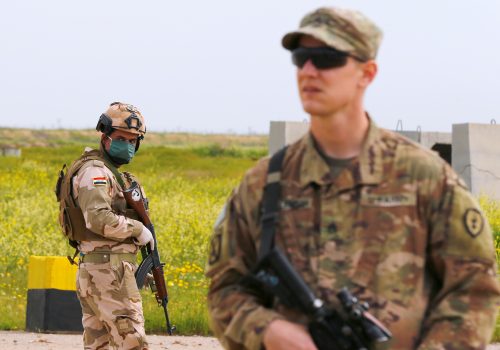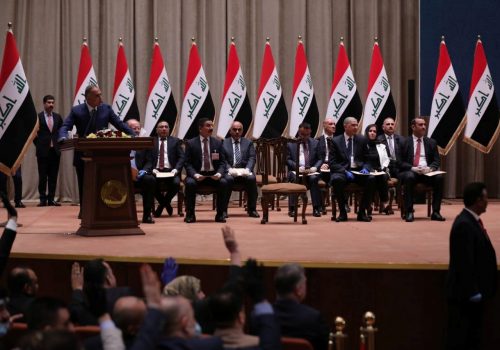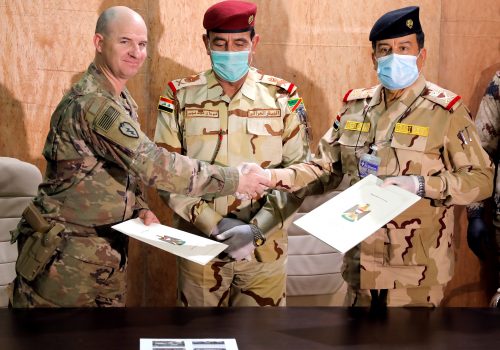Iraq’s new prime minister must manage expectations
Mustafa al-Kadhimi was confirmed as prime minister of Iraq on May 6 and the task before him has rightly been called a suicide mission. There is hardly any national issue that does not present a potentially crippling challenge for al-Kadhimi. He faces a virtually bankrupt treasury, public sector expenses that are among the highest in the world, collapsing public services, entrenched corruption, a resurgent Islamic State of Iraq and al-Sham (ISIS), rogue militias, rising US-Iran tensions, and the prospect of renewed demonstrations as the summer advances.
Alongside these hurdles, there is one that al-Kadhimi must be the most cautious in tackling—the management of expectations.
Soon after he had been confirmed in parliament, laudatory songs were launched in his praise in a style that became popular in the Saddam Hussein era and during former prime minister Nouri Al-Maliki’s time in power. No one suspects the quiet and reserved al-Kadhimi of welcoming such sycophantic behavior, but it hints at the dangers he faces in terms of the public’s desire for results.
Every sector of Iraqi society wants something out of this government and they want it now. Public sector employees and retirees fear benefit cuts and want their full pay. Meanwhile, unemployed youth want government jobs for financial security. The public wants an end to corruption. Most pressingly, the protesters who unseated former Prime Minister Adil Abdul-Mahdi expect al-Kadhimi to bring the murderers who killed seven hundred demonstrators in the squares of Baghdad and Iraq’s southern cities to account and to hold early elections.
Al-Kadhimi’s governing program approved by parliament is ambitious, though more focused than the ones presented by his two predecessor nominees for the premiership. Still, even without early elections, the government has a life span of only two years, which is a pitifully short time to remedy ills that have accumulated over seventeen years.
Three of the first nine priorities in al-Kadhimi’s program respond to the core demands of the protesters: holding early elections, initiating a process of accountability for perpetrators of violence against protesters, and combatting corruption. The program does not specify a time frame for fulfilling these pledges, but people will be watching, waiting, and counting days. At least three other priorities raise challenging expectations: bringing all arms under government control, negotiating the presence of foreign forces in Iraq, and confronting the economic crisis through a new budget process.
Two domestic constituencies will be measuring al-Kadhimi’s delivery on these priorities. The first, are the political parties who did not support his candidacy and, perhaps, some that did so, reluctantly. They will seize every opportunity to discredit the prime minister or his cabinet, accusing them of failure, delay, or prevarication. Even ostensible political friends will be watching for missteps to criticize.
In a tweet by Saleh Al-Iraqi, who is believed to be a close relative of Muqtada Al-Sadr, he indicates that Sadr is giving al-Kadhimi a one hundred-day grace period. The implication is that if al-Kadhimi does not achieve results by that point, Sadr will take action.
The second constituency comprises the protesters whose demands and pressure led to the resignation of former Prime Minister Abdul-Mahdi in the first place. They, too, will be waiting to see if al-Kadhimi follows through on his promises. However, fulfilling the demands of the protesters may anger not only al-Kadhimi’s political opponents but also some of his political supporters.
Although demonstrations receded with the onset of COVID-19 and the holy month of Ramadan, there are signs that they are re-emerging in cities such as Nasriya and Wassit. In an ideal world, the new government would be given the time and breathing room to tackle the many challenges it faces, but patience is limited and nerves are strained.
How can al-Kadhimi navigate this minefield in the next few weeks and months?
Fortunately, al-Kadhimi’s background is rooted in civic, not political, culture. This inclines him to be attuned to the needs and demands of the population.
The immediate objective should not necessarily be to complete the program of priorities in a short period of time but, rather, to take concrete and demonstrable steps towards their fulfillment and to be candid with the public about the process and the timeline, which will inevitably be longer than desired. Transparency will build public trust, and confidence that the government is not dithering.
True to his word, on May 9, barely two days after assuming office, al-Kadhimi announced the formation of a team of experts to consult with Iraq’s High Electoral Commission (IHEC) on steps towards holding early, fair elections. The cabinet needs to send the new election law to parliament so that they can fill the numerous gaps and finalize contentious articles. Other steps are needed; the “exceptional budget” promised in the program should include the allocation of funds to build the human and technical capacity of IHEC. All this will take time and there will be tension between the expectations of protesters, who called for elections in six months, and what is practically feasible. The prime minister must be honest about the steps required, which, in turn, will determine the timetable for elections.
The prime minister also acted quickly on accountability for violence against protesters. In the same May 9 announcement, he issued an order to release all detained protesters and announced the launch of an investigation into events surrounding the protests. As a human rights advocate, al-Kadhimi understands the complexity of addressing human rights abuses. His predecessor, Prime Minister Abdul-Mahdi, also, formed an investigatory commission, which was widely viewed as a sham. To be acceptable to a majority of the population, a new investigation cannot pursue rough and ready justice—it must meet high evidentiary standards. This will entail a multi-step process that will be slower than people expect, possibly, leading to frustration and anger. Al-Kadhimi needs to work with civil society groups, the Independent Human Rights Commission—which has been unexpectedly bold in reporting abuses—and the UN human rights office in Baghdad. Above all, al-Kadhimi needs to report progress periodically.
The most intractable priority is combatting systemic, pervasive corruption. Efforts to uproot it will hurt many political heavyweights. And, while protesters’ calls for holding past corrupt office-holders to account are justified, the immediate task is to look forward and establish measures to end or curtail corruption in the present government. Ending corruption is not a single act but a process. It will necessitate several measures, including: the rigorous monitoring of procurement and financial transactions in public institutions, monitoring the flow of funds through the banking system, ending smuggling and extortion by rogue groups, and adopting electronic means of tracking expenditure and performance. Such measures will build the framework for future investigations into past corruption by former officials and/or political parties.
Al-Kadhimi also announced that he will form a committee to address the strategic dialogue with the United States set to take place in June. It is an understatement to say that both friends and foes are watching. Anticipating the talks, Mohammed Al-Ghabban, leader of the Fateh bloc in parliament, published a surprising statement on his Facebook page, which underscores that the Iraqi people are observing this process closely.
What can the United States do to help Iraq in these negotiations? The thing not to do is make over-ambitious and immediate demands. The new government needs practical support from all friends and partners on at least two urgent fronts: the stabilization of a failing economy and an increase in training, logistical, and intelligence support to fight a reinvigorated ISIS. The Strategic Framework Agreement (SFA) of 2008 offers ample room for assistance in both arenas.
Furthermore, the United States must accept that, after years of governance missteps, internal conflict, and ISIS violence, the strengthening and reform of Iraqi state institutions will take time. This is particularly true with regard to establishing state control over militia activities and asserting Iraq’s sovereignty, including curbing Iranian influence in Iraq. However, this new government is the best chance Iraq has had since 2003 and it is important to tread carefully—the political structure in Iraq is fragile and excess stress is likely to cause irrevocable damage. The United States should, instead, work to seize the rare opportunity this new government presents.
Rend Al-Rahim is co-founder and president of the Iraq Foundation. She is a former ambassador of Iraq to the United States and a member of the Advisory Committee of the Atlantic Council’s Iraq Initiative.
Image: Iraqi Prime Minister-designate Mustafa al-Kadhimi delivers a speech during the vote on the new government at the parliament headquarters in Baghdad, Iraq, May 7, 2020. Iraqi Parliament Media Office/Handout via REUTERS


